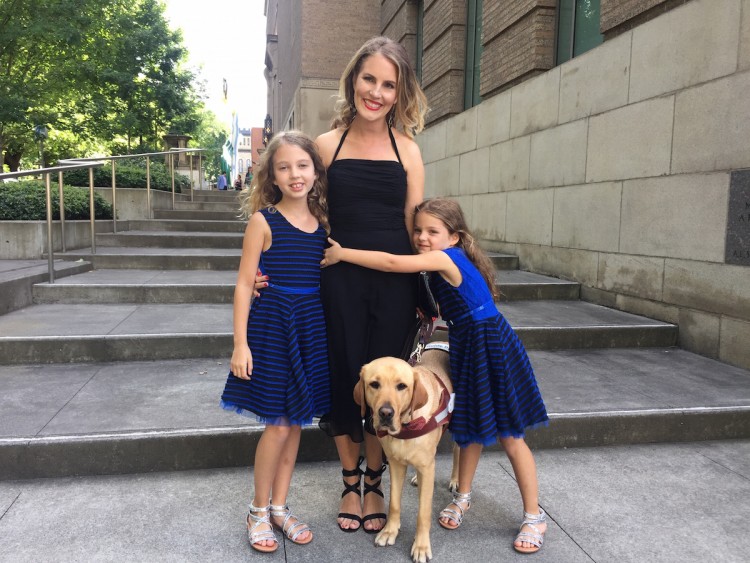People often ask me how I ended up with such amazing kids. “What did you do,” they ask, “to end up with such sweet, easy-going kids?” I’m not saying this to brag, and my girls do have their moments of misbehavior like any other kid. But I do feel like they’re pretty remarkable. And I don’t think it’s anything I did. I do have a hunch, however, that growing up with a mom who doesn’t see like other moms has something to do with it.
I think they, like many children who have a parent with a disability, understand certain things about life that other kids their age may not yet get.
I recently asked my daughters, ages 10 and 6, what those things are, and here’s what we came up with:
1. Sometimes you have to take the long way.
Whether waiting for a late bus or lost Uber, my kids know that we sometimes have to leave an hour before we need to be somewhere that most parents can drive to in 10 minutes. They also know that we need to allow time to relieve, water and harness Mommy’s guide dog. On Mondays we walk to my younger daughter’s gymnastics class, which is about a 30-minute walk and a 5-minute drive. Sometimes when we’re halfway home after class, my daughter hangs her head dramatically and says, “I bet all the other kids are already home eating dinner by now!” And I say, “Yes, I bet they are.” (And sometimes I add something about those kids not getting the good exercise she’s getting by walking!)

2. Kids can do a lot of stuff.
Children are often more capable than many adults think. Whether we like it or not, children of parents with disabilities often end up lending a hand (or foot or ear or eye) to their moms and dads. Inadvertently, they often end up learning how to do certain things that typically parents do. My 10-year-old, for example, has become a pro at pinning our location when we order an Uber, as this is often difficult for me, even with zooming or using the voiceover on my phone.
While I try my best to make sure my kids get to be kids and aren’t expected to do adult tasks, I am often surprised at how willingly and capably they do things that many people would underestimate their child’s ability to do, such as reading labels on food packaging and learning bus routes. I don’t love the fact that I often have my daughters check over my makeup in the morning, but when we’re running out the door and there’s no one else to ask, they’re my go-to girls. And really, I don’t think there’s much harm in having to tell your mom her eyeshadow is uneven.
3. Life isn’t always fair.
Sometimes you try your best, and you still end up last. It doesn’t make sense why some moms can walk and some can’t, why some dads can see and other can’t, or why some moms can’t get out of bed in the morning. Sometimes life just isn’t fair. It can be a tough lesson to learn, but one that leaves kids very much in touch with reality.
4. You can’t judge a book by its cover.
When my girls see someone with a cane or any kind of assistive device, they understand that’s only a little piece of that person. They know it doesn’t mean the person is incapable. They also know physical disabilities don’t necessarily correlate with mental ones. And most importantly, that any disability, whether physical or mental or emotional, does not affect a person’s ability to do good in the world.
5. Flexibility is the key to most everything.
Over the years, my girls have probably ridden in more modes of transportation than anyone their age — or my age. Between friends and family’s cars, neighbors’ minivans, Ubers, Lyfts, taxis, busses, trains, planes and boats, they have had to figure out a million seat belts and seat configurations, wedging themselves wherever they will safely fit. They have waited outside for late busses for over an hour, been late to activities even though they themselves were ready on time, and changed vehicles at the last minute. They know waiting, and they know change, and they have the ability to be flexible.
